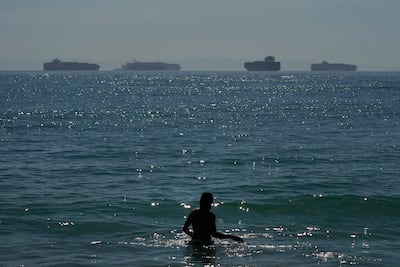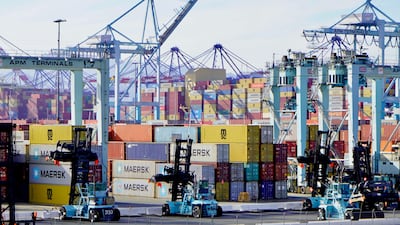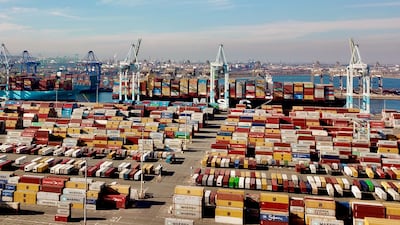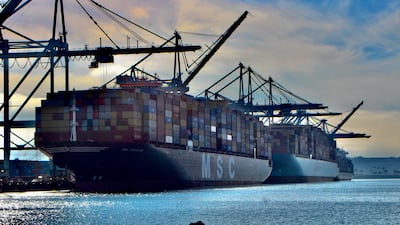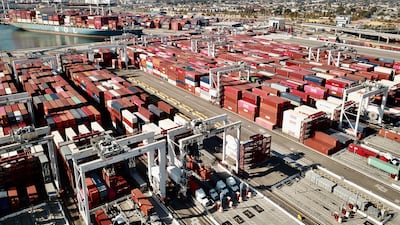Americans are dealing with inconveniences seldom seen in the land of plenty: empty supermarket shelves, lengthy waits for items ordered online and fast-rising prices on everything from milk to petrol.
Kinks in the global supply chain have caused shortages across the world, but in the US problems have been compounded by the country's crumbling infrastructure, which the recently passed bipartisan infrastructure bill aims to improve after decades of neglect by Washington.
It's all taking a toll on President Joe Biden, whose popularity has taken a plunge in recent weeks, with his administration scrambling to address the issue ahead of the busy holiday season and hoping it's not too late to save his legacy.
Speaking from the Port of Baltimore, Mr Biden addressed supply chain issues on the minds of many Americans as the holiday shopping season begins, admitting that freight logistics and the economy are incredibly complex issues.
“As long as goods and materials are getting where they need to go on time, there’s usually no need to worry about the supply chains, but when global disruptions hit, like a pandemic, they can hit supply chains particularly hard,” said Mr Biden.
“Covid-19 has stretched global supply chains like never before. And suddenly, when you go to order a pair of sneakers or a bicycle or Christmas presents for the family, you’re met with higher prices and long delays.”
The Port of Baltimore in Maryland, which boasts over 15,000 employees, is responsible for importing and exporting the bulk of the nation’s autos, farm machinery and construction equipment.
“Instead of pointing fingers, we’re seeing folks start to work together – railroads, ocean liners, labor, state and local governments.
“Progress has already begun and now we passed the bipartisan infrastructure bill, the deal, it’s only going to accelerate.”
The kinks in the supply chain are also effecting how the Covid-19 vaccine gets to the people that need it most, which Secretary of State Antony Blinken also addressed in a statement released on Wednesday.
“To ensure that vaccine doses reach people in need, Global Covid Corps, a coalition of leading private sector companies, will provide pro bono expertise, tools, and capabilities to support logistics and vaccination efforts in low- and middle-income countries,” Mr Blinken’s statement read.
“This effort, which includes some of the largest US-based and non-US-based multinational corporations, will work with and support countries in key areas including supply management, supply chain logistics, vaccine site network infrastructure, vaccine site optimization, and demand generation.”
On Tuesday, the White House announced several measures including grants to update ports and a "pop-up" container yard at the Port of Savannah to help alleviate backlogs at other docks.
The National visited the Port of Los Angeles in San Pedro, California, where at least 78 cargo ships were anchored offshore, waiting for empty berths to unload their goods.
Such wait times are unprecedented. In 2014, operators were aghast when a record 14 vessels were left without a free berth. Some of the cargo ships have been stuck for two weeks, with an average of 14,000 containers on board, many carrying perishable cargo and chemicals with expiration dates.
Workers could be seen scrambling to get containers offloaded on to the backs of 18-wheelers flowing into the port. Pressured by Mr Biden, the Port Authority has agreed to keep operations running around the clock until the backlog is resolved.
Together with the nearby Port of Long Beach, the port already receives about 40 per cent of all inbound containers for the entire US supply chain.
Since the pandemic began, containers coming into the US, mostly from Asia, have increased by 30 per cent, with White House data showing that more than seven million containers arrived in Southern California between January and September of this year — 18 per cent higher than the same period in 2018, breaking the ports’ previous record.
This summer, the Port of Los Angeles became the first in the Western Hemisphere to process 10 million container units in a year, closing out the 2020-2021 fiscal year with about 10.9 million Twenty-Foot Equivalent Units (TEUs).
In May 2021, the port had its busiest month in its 114-year history.
But the hulking mega ships have been left idling for weeks on end because their cargo isn’t being offloaded and leaving the ports fast enough.
Like many places around the world, the pandemic triggered layoffs and furloughs. Many people have chosen to retire early or are refusing to continue working for low wages.
Among those quitting: thousands of truck drivers fed up with poor working conditions, stressful schedules and onerous demands from employers.
Before the pandemic, the American Trucking Association estimated that 45,000 workers were needed to keep goods on shelves. That number is now 60,000.
In comments following last week's Congressional approval of his bipartisan infrastructure improvement plan, Mr Biden said the pandemic has shone a spotlight on the vulnerabilities of global commerce lines.
"We cannot go back to business as usual. This pandemic won’t be the last global health crisis we face," he said.
The CDC recently reported that 1 in 500 Americans has died of Covid-19.
Mr Biden said decades of neglect and underinvestment in US infrastructure have left the links supply chains "struggling to keep up with the rapid and persistent increase in goods movement that the pandemic has generated."
“This poses a collective action problem in the largely private system that moves containers of goods from ships to docks to trains and trucks to get distributed to warehouses, factories, and stores.”
The Port of Los Angeles has been in desperate of need of infrastructure updates for decades, such as upgrades to its weakened docks, expansion to freight-rail lines and the long overdue addition of physical storage facilities.
California Governor Gavin Newsom signed an executive order to help alleviate the stress at his state's beleaguered ports in October.
“California’s ports are critical to our local, state and national economies and the state is taking action to support goods movement in the face of global disruptions,” said Mr Newsom in a statement.
Communication breakdown
Many of these stresses could have been mitigated with an investment in better software infrastructure, said Joe Bellini, executive vice president of One Network Enterprises, which operates in the digital supply chain network.
Such software can predict and plan future constraints in the supply network, "along with the ability to optimise usage of scarce supply,” he told The National.
In other words, a communication breakdown across all links of the chain is exacerbating what most agree are preventable delays.
Mr Biden has also committed to help other areas affected by the supply chain backlog, like America's antiquated railway system.
The Association of American Railroads recently said that Chicago's rail yard is beginning to back up as much as the ports of Southern California.
Chicago is the nation's railroad capital, where eastern lines intersect the west. When California's port operators can't see rail clogs in Chicago, backlogs form and retailers aren't able to get goods on shelves.
"These issues go through the entire chain, from ship to shelf," Secretary of Transportation Pete Buttigieg told reporters.
"That's why we're not just working with the ports. It's the truckers, the rail companies, the operators and also those retail companies that are at the other end of those supply chains."
In Chicago, lorry drivers in a hurry to grab their next load have taken to leaving full cargo containers at random places on the yard, blocking four and five other containers at a time, creating a nightmarish domino effect.
Big rig drivers are often paid per load and losing access to them takes food of their tables.
"Truck drivers — there’s a reason the turnover is so high," said Mr Buttigieg.
"And the way they’re compensated, they’re often not compensated for their time, which means that their time is wasted freely sometimes when they’re waiting for a load at a port, for example...They are the absolute backbone of a big part of our supply chain, and we need to respect and, in my view, compensate them better than we have."
